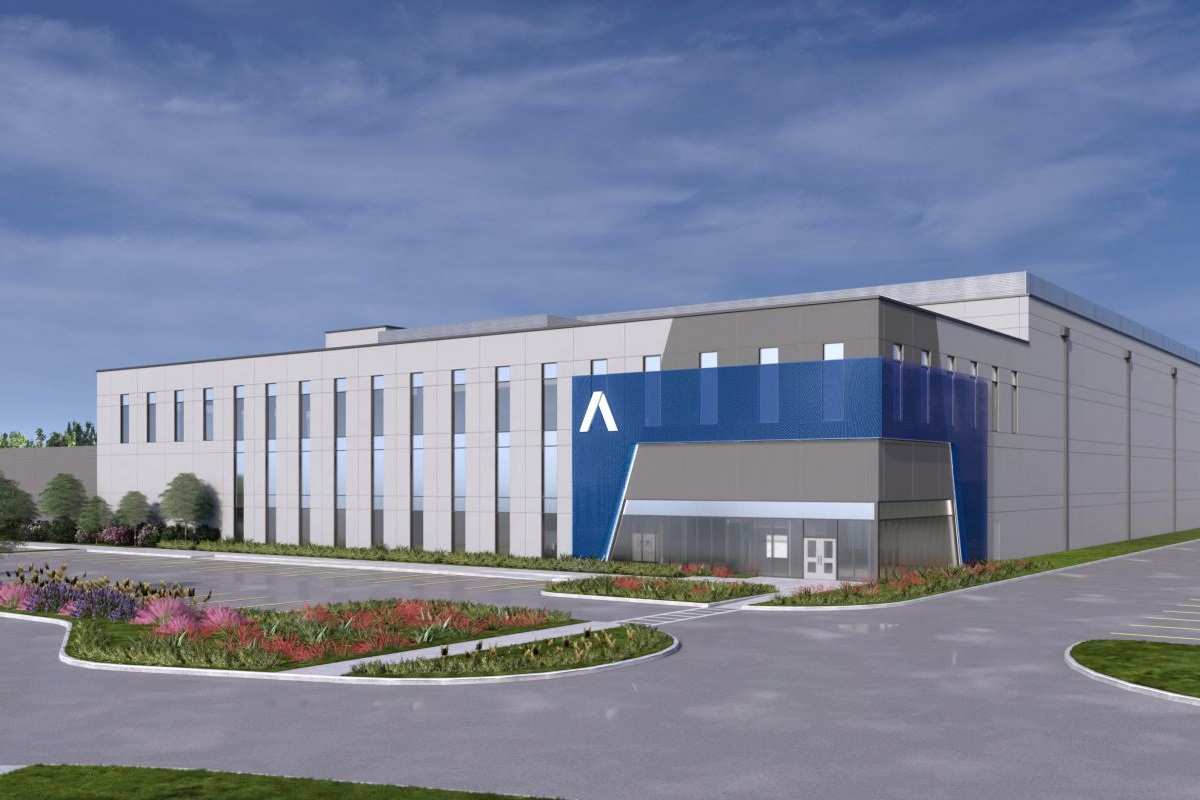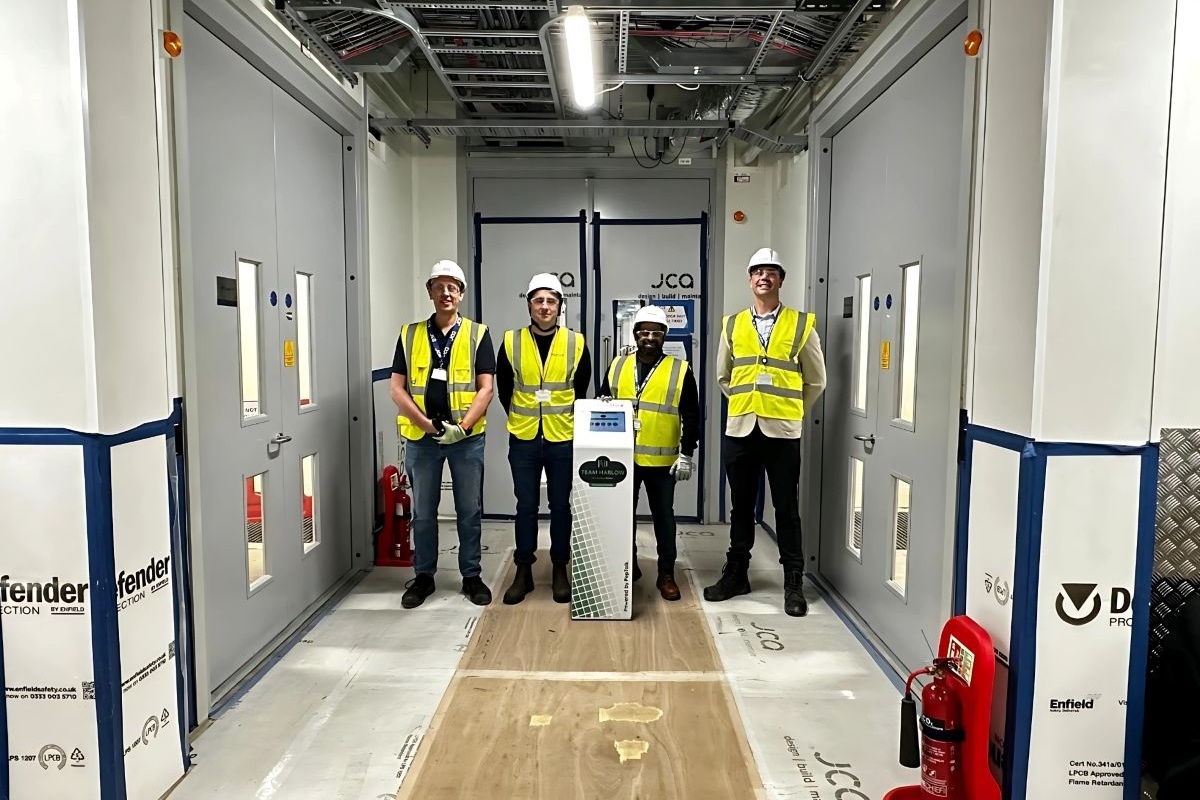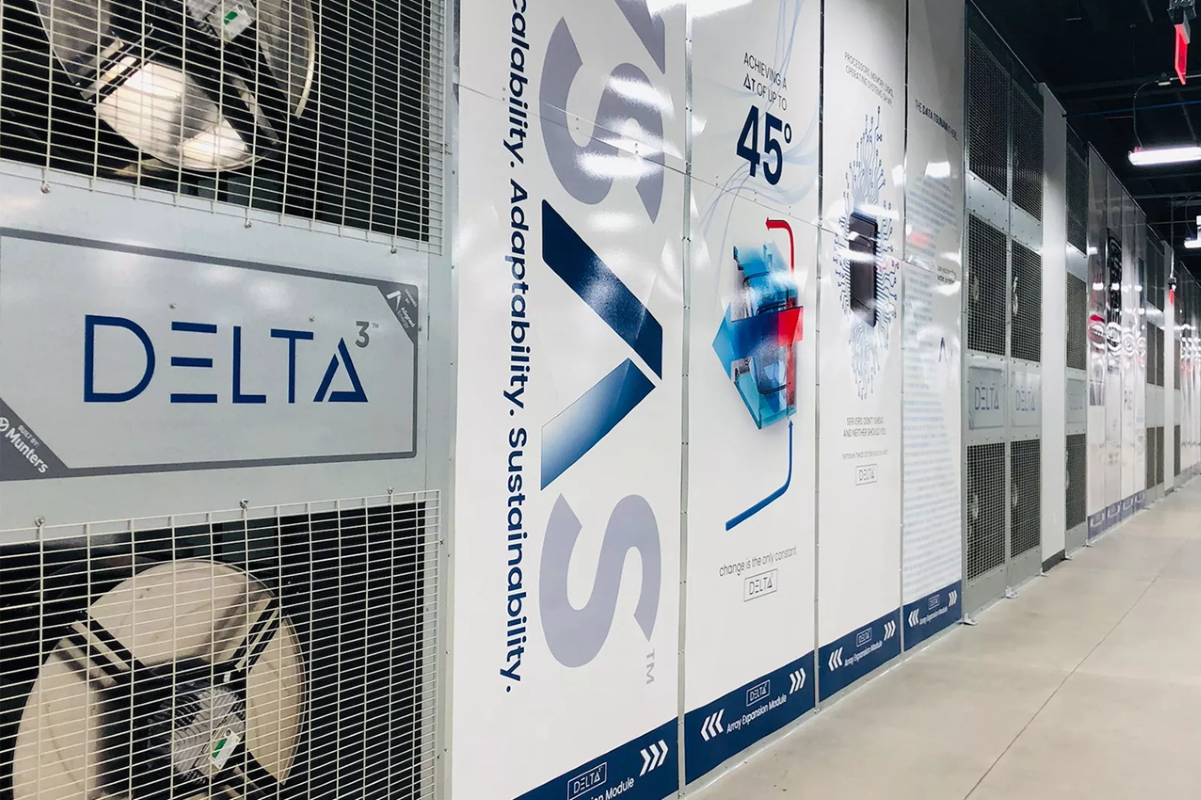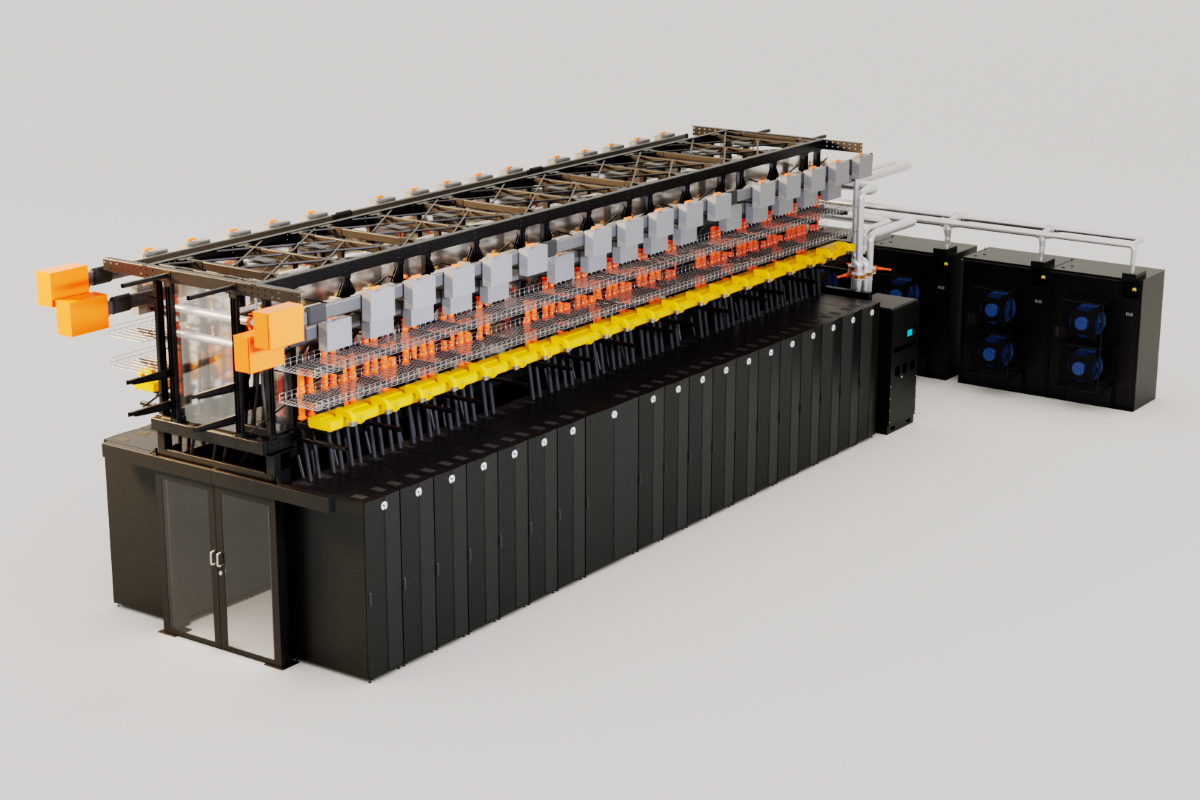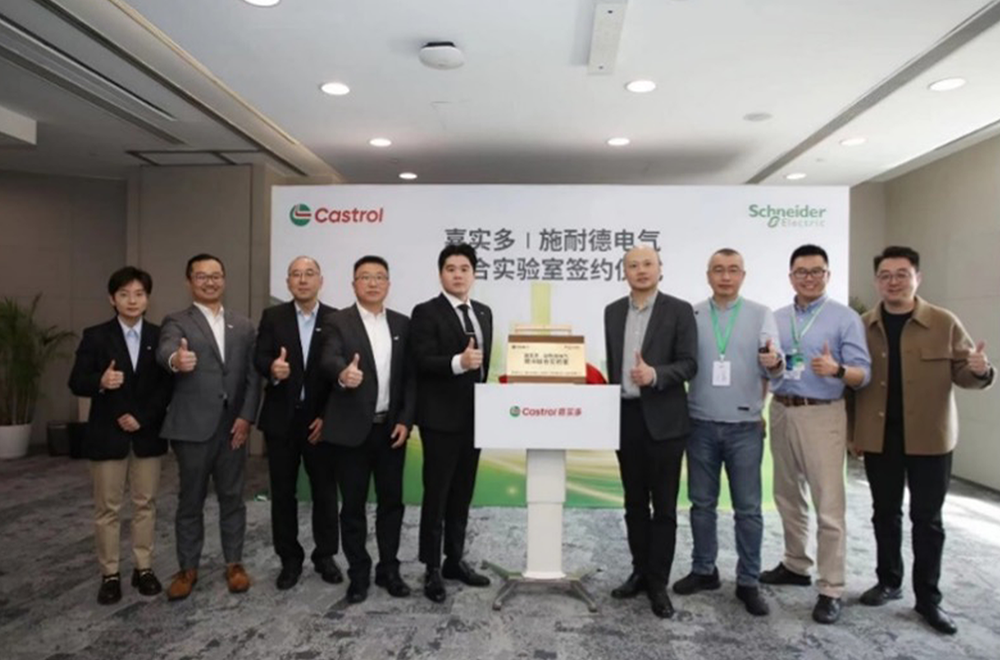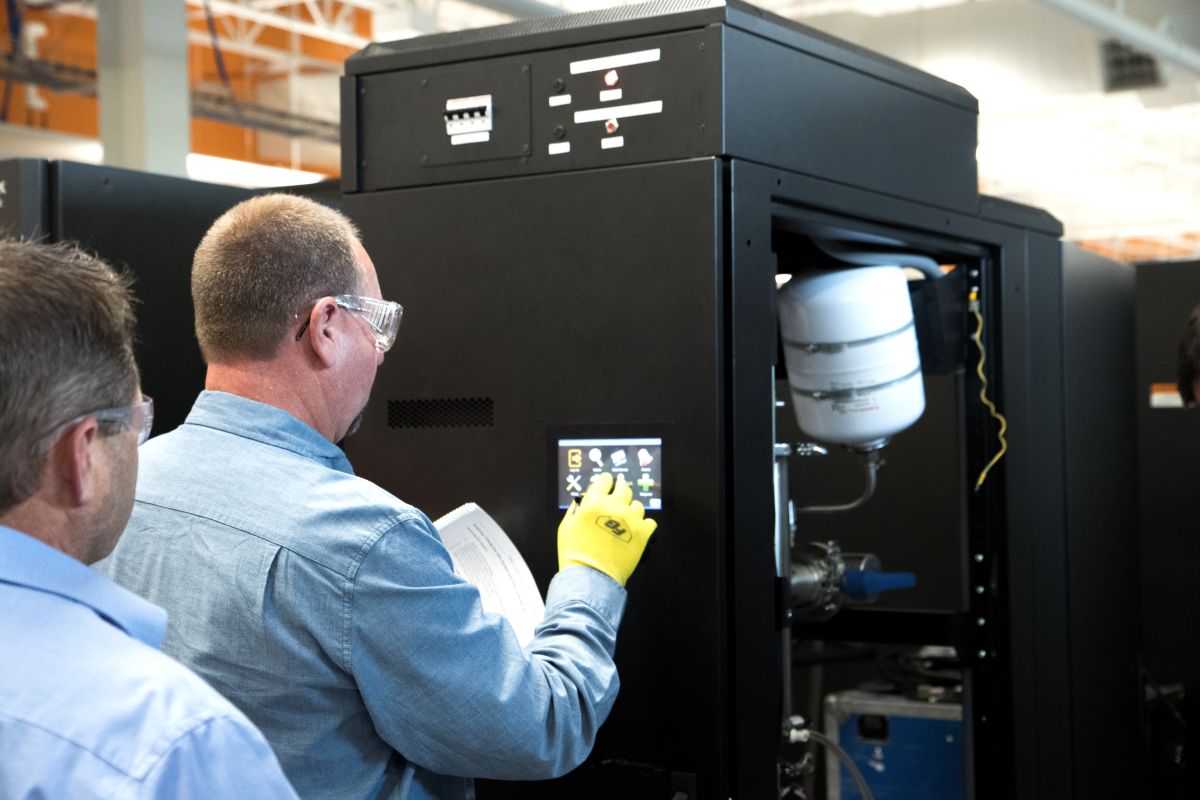Liquid Cooling Technologies Driving Data Centre Efficiency
Data Centre Infrastructure News & Trends
Data Centres
Infrastructure Management for Modern Data Centres
Liquid Cooling Technologies Driving Data Centre Efficiency
News
Aligned and Lambda to power next-gen AI infrastructure
Aligned Data Centers, a technology infrastructure company offering innovative, sustainable and adaptive scale data centres and build-to-scale solutions for global hyperscale and enterprise customers, has announced a partnership with Lambda, the AI developer cloud, to provide customers with data centre infrastructure and an AI cloud platform ready to sustainably accelerate their AI growth. Lambda will occupy Aligned’s newest Dallas-Fort Worth area facility, DFW-04, which will be designed to be a liquid-cooled data centre capable of supporting the highest-density Graphics Processing Units (GPUs).
“We’re proud to partner with Lambda to support the buildout of its GPU cloud infrastructure, accelerated by NVIDIA, for AI deployments, which is transforming how AI developers innovate and businesses utilising AI models operate,” states Andrew Schaap, CEO of Aligned. “Particularly in Dallas, where demand for AI computation space has spiked interest in a growing market, combining a GPU cloud built specifically for AI workloads with an AI-ready data centre designed with liquid cooling technologies capable of supporting the highest-density environments will be a game changer.”
Aligned is at the forefront of building and operating adaptive data centres that future-proof IT infrastructure and provide seamless flexibility for transitions between a variety of deployments ranging from enterprise applications, to cloud, and high-density AI implementation. The company’s ultra-scalable and flexible Adaptive Modular Infrastructure (AMI) and innovative air, liquid, and hybrid cooling solutions future-proof IT deployments, mitigate IT obsolescence, and maximise asset lifespan.
While committing to sustainability as a core pillar of its customer-focused business strategy, the company has been advancing data centre energy efficiency and cooling technologies for more than a decade, including its patented Delta3 air-cooled system. Aligned's patent-pending DeltaFlow liquid cooling system delivers excellent performance for AI innovation, supporting virtually any density and GPU cloud requirement, and the company’s scalable, sustainable infrastructure is enabling next-generation AI workloads. Aligned says that its partnership with Lambda exemplifies its dedication to leading AI service providers.
Lambda's AI Developer Cloud is used by AI engineers and industry experts who have shaped modern artificial intelligence. The partnership with Aligned will see Lambda’s AI Cloud platform integrated into the company’s new DFW-04 data centre, which is currently under construction in Plano, Texas. A determinative factor of this alliance is that Aligned’s seamless and adaptive infrastructure for next-gen AI will easily support infrastructure accelerated by NVIDIA Blackwell and NVIDIA Blackwell Ultra, as well as the future generations of AI platforms.
“With its unrelenting focus on driving disruptive innovation in data centre design, energy efficiency and cooling, Aligned is the ideal partner to help Lambda build large, flexible space that meets the AI demands of today and tomorrow,” comments Lambda VP, Data Center Infrastructure, Ken Patchett. “Deploying AI at scale is no easy feat, and Aligned’s ability to rapidly deliver AI-ready infrastructure, along with its passion for supporting customers with a consistently high-touch, world-class experience, is instrumental to meet the aggressive scale, quality and speed standards Lambda sets for its public and private deployments.”
For more from Aligned Data Centers, click here.
Simon Rowley - 8 May 2025
Data Centres
Liquid Cooling Technologies Driving Data Centre Efficiency
News
Kao Data and PepTalk to champion culture at new data centre
Kao Data, a specialist developer and operator of data centres engineered for AI and advanced computing, has partnered with JCA Engineering and global workforce engagement platform, PepTalk, to bring a first-of-its-kind, people-first approach to the construction of its new KLON-03 data centre, which allows AI users to deploy multi-megawatts (MWs) of direct-to-chip, liquid cooled infrastructure, alongside traditional air-cooled servers within the same Technology Suite.
As AI workloads continue to reshape global infrastructure demands, Kao Data is setting a new benchmark - combining cutting-edge engineering with a proactive focus on team wellbeing, safety, and performance. By embedding PepTalk’s real-time workforce intelligence into daily site operations, the project aims to elevate decision-making, anticipate risks early, and foster a stronger, safer site culture from the ground up.
PepTalk’s platform gathers live, anonymous feedback directly from the workforce, offering leadership a constant pulse on team morale, communication, and engagement. Instead of using feedback purely as a sentiment check, the system enables site managers to identify blind spots, unlock opportunities for improvement, and build a shared culture of accountability.
“As we build KLON-03, one of the UK’s most advanced AI-ready facilities, we want the same high standards applied to our technology reflected in the way we support people on site,” says Gavin Fernandez, Commercial & Delivery Director at Kao Data. “PepTalk’s insight helps us stay close to what matters - safety, morale, and team alignment - so we can deliver smarter and faster, with care.”
PepTalk has supported major construction projects across Europe and the US, helping reduce incidents, improve retention, and drive measurable cultural improvements.
“This partnership with Kao Data and JCA Engineering reflects a shared belief that world-class infrastructure is built not just by engineers, but by engaged, motivated teams,” says James Brogan, CEO and Co-founder of PepTalk. “With PepTalk embedded from day one, KLON-03 is leading the way in how culture can power performance.”
For more from Kao Data, click here.
Simon Rowley - 30 April 2025
Cooling
Data Centres
Liquid Cooling Technologies Driving Data Centre Efficiency
News
Arteco launches direct-to-chip liquid cooling for data centres
Arteco, a provider of liquid cooling innovations, today announced its expansion into the data centre and electronics market with its Zitrec EC brand.
The company states that the new brand arrives at a "critical moment", citing the escalating computational demands of today’s powerful technologies - like Generative AI and Large Language Models - which produce unprecedented heat loads which are threatening system performance, energy efficiency, and hardware reliability in the event that improved thermal management solutions aren't implemented.
Zitrec EC, which is a versatile portfolio of Mono Propylene Glycol (MPG)-based, water-based and Mono Ethylene Glycol (MEG)-based formulations with OAT (Organic Additive Technology), is specifically designed to help tackle these challenges. This advanced range of direct-to-chip coolants is engineered to deliver exceptional thermal performance and energy efficiency, allowing components to operate at higher calculating power without the risk of overheating. Its advanced features provide long-lasting corrosion protection, which can extend equipment lifespan and provide a safeguard against downtime. Zitrec EC therefore simplifies hardware maintenance, Arteco says, while significantly lowering the total cost and complexity of thermal management systems.
“In this incredibly exciting era of AI and other technological advancements, we recognised a clear opportunity to combine our decades of cooling expertise with our relentless pursuit of innovation and sustainability, thereby empowering the digital infrastructure of tomorrow,” says Serge Lievens, Technology Manager at Arteco.
Alexandre Moireau, General Manager of Arteco, adds, “Our biggest strength in this new Zitrec EC chapter is the same unwavering commitment to product excellence and deep customer intimacy that established us as a trusted leader in the automotive world. In the data centre space, we will continue to proactively co-create with our customers, delivering tailored cooling solutions that meet, and exceed, their most demanding requirements. This is how we want to set new standards in thermal management in the data center and electronics market.”
As part of its broader sustainability strategy, Arteco has also announced the upcoming launch of a new bio-based MPG addition to its new Zitrec EC line. This new product complements the existing recycled MPG variant, underscores Arteco’s commitment to environmentally responsible innovation and offers the same product performance and quality as the other products in the Zitrec EC range.
For more from Arteco, click here.
Simon Rowley - 29 April 2025
Cooling
Data Centres
Liquid Cooling Technologies Driving Data Centre Efficiency
News
Aligned Data Centers breaks ground on Glendale facility
Aligned Data Centers, a technology infrastructure company offering innovative, sustainable and adaptive scale data centres and build-to-scale solutions for global hyperscale and enterprise customers, has broken ground on its PHX-13 facility.
The Glendale campus spans 100 acres and represents a significant expansion of Aligned's data centre footprint, the company tells us. At the heart of this development is PHX-13 - one of four planned facilities for the site. To support the campus’s energy needs, the project will incorporate a new 230 kV transmission line provided by Arizona Public Service (APS).
“I am excited to see PHX-13 break ground,” says Glendale Mayor, Jerry P. Weiers. “In 2025, data centres are essential to the US economy and future growth. This project and all the benefits it will bring are exciting for our Glendale community.”
Aligned says that is committed to sustainability and operational efficiency. The company’s Delta³ air cooling arrays will be utilised in PHX-13 to capture and remove heat at the source, rather than pushing cold air into the data hall like legacy facilities. The data centre will also feature Aligned's patent-pending DeltaFlow liquid cooling system, which delivers excellent performance for AI workloads and supports virtually any density and GPU cloud requirement. Additionally, Aligned will use its closed-loop cooling system, recycling water to significantly reduce water consumption.
All of Aligned’s power comes from renewable sources, actively progressing toward the goal of achieving zero-carbon hosting by 2040. In line with this commitment, the Glendale campus is a model of sustainable redevelopment. The site, once a rose farm, has been transformed into a state-of-the-art data centre campus, resulting in a more than 73% reduction in annual water use.
Aligned retained the site's unused well rights, allowing groundwater to remain on-site and supporting local ecological balance.
This facility, like all of Aligned’s data centres, will leverage its Adaptive Modular Infrastructure (AMI), compared to traditional, stick-built methods. By prefabricating components offsite and delivering them to the site as required, Aligned is enhancing safety, quality, sustainability, and speed. This modular design and construction methodology provides exceptional flexibility, ensuring the longevity of Aligned asset's and delivering lasting benefits to the Glendale community.
For more from Aligned Data Centers, click here.
Simon Rowley - 22 April 2025
Data Centre Infrastructure News & Trends
Data Centres
Liquid Cooling Technologies Driving Data Centre Efficiency
News
Vertiv announces launch of prefabricated infrastructure portfolio
Vertiv, a global provider of critical digital infrastructure and continuity solutions, has announced the launch of Vertiv SmartRun.
Vertiv SmartRun is a modular prefabricated overhead infrastructure system designed to integrate high-density power distribution busbar, liquid cooling piping network, hot-aisle containment, and network infrastructure into a single, scalable solution, supporting an accelerated data centre fit-out.
This all-in-one solution is designed to reduce complexity and accelerate deployment times of cloud and AI training applications for greenfield and retrofit colocation and hyperscale data centres.
Deploying Vertiv SmartRun delivers significant advantages in scalability and efficiency, Vertiv states, providing end-to-end speed and adaptable configurations to meet various design requirements. With prefabricated assembly, plug-and-play design, and a simplified one-lift installation process, Vertiv SmartRun can deploy up to 85% faster on-site than traditional stick-build methods, enabling data centre installations greater than 1MW per day with just a single crew. The pre-designed system reduces labour needs for engineering review and installation of busway, piping, network cabling, and hot-aisle containment systems, offering a streamlined approach to integrating overhead infrastructure.
The system also addresses the whitespace challenges of incorporating new heat removal technologies into AI data centres, by integrating a secondary fluid network into the Vertiv SmartRun design. Prefabricated stainless steel piping systems mitigate complexity of design, fabrication, and start-up, providing a single source for end-to-end data centre liquid cooling support.
“As digital infrastructure demands evolve, organisations require solutions that accelerate growth without adding complexity,” says Viktor Petik, Senior Vice President, Infrastructure Solutions at Vertiv. “Vertiv SmartRun is a strategic investment in high-density, prefabricated infrastructure that brings operational agility and enables seamless expansion to support the future of high-density computing.”
Vertiv SmartRun is backed by Vertiv Liquid Cooling Services and Vertiv Services, a global network of trained experts available to provide comprehensive support for the installation, maintenance, and optimisation of liquid cooled infrastructure, supporting efficient thermal management and long-term reliability in high-density environments.
For more from Vertiv, click here.
Simon Rowley - 15 April 2025
Artificial Intelligence in Data Centre Operations
Cooling
Data
Data Centre Operations: Optimising Infrastructure for Performance and Reliability
Data Centres
Liquid Cooling Technologies Driving Data Centre Efficiency
Compu Dynamics launches AI and HPC Services unit
Compu Dynamics has announced the launch of its full lifecycle AI and High-Performance Computing (HPC) Services unit, showcasing the company’s end to end capabilities.
The expanded portfolio encompasses the entire spectrum of data centre needs, from initial design and procurement to construction, operation and ongoing maintenance, with a particular emphasis on cutting-edge liquid cooling technologies for AI and HPC environments.
Compu Dynamics’ new AI and HPC service offerings build on the company’s expertise in white space deployment, including advanced liquid cooling and post-installation services. As a vendor-neutral solutions provider, the company is uniquely positioned to support equipment from virtually every manufacturer with no geographical limitations, ensuring clients receive unbiased recommendations and optimal solutions tailored to their specific requirements.
"Our advanced AI and HPC service offerings represent a significant evolution in data centre services," says Steve Altizer, President and CEO of Compu Dynamics. “We have created this team to respond to the accelerating demand for highly-qualified technical support for high-density AI data centre infrastructure. By working with a variety of OEM partners and offering true end-to-end solutions, we are empowering our clients to focus on their core business while we handle the complexities of their modern critical infrastructure."
The company’s holistic solutions portfolio addresses the growing need for specialised support in high-density computing environments. Compu Dynamics’ innovative liquid cooling solutions are said to offer superior efficiency and reduced energy consumption, making them essential for future-ready data centres. Key highlights of these service offerings include:
· Equipment evaluation, design consultation and procurement.
· Power distribution and liquid cooling system installation, startup, commissioning and quality assurance/quality control.
· Flexible maintenance service options designed for seamless, worry-free support including comprehensive fluid management, coolant sampling and contamination and corrosion prevention.
· Onsite staffing for day-to-day technical operations.
· Dedicated customer success manager.
· 24x7 emergency response team for technical issues and repair services.
"As AI and HPC workloads drive unprecedented demand on data centre infrastructure, our liquid cooling expertise has become increasingly crucial,” says Scott Hegquist, Director of AI/HPC Services at Compu Dynamics. “We're committed to helping our clients navigate these challenges, providing cutting-edge solutions that optimise performance, efficiency and sustainability."
Carly Weller - 11 April 2025
Cooling
Data Centres
Liquid Cooling Technologies Driving Data Centre Efficiency
News
Castrol and Schneider Electric launch liquid cooling lab in Shanghai
Castrol and Schneider Electric have opened a new liquid cooling technology co-laboratory in Shanghai under a strategic partnership agreement. This collaboration aims to offer customers new innovations in data centre cooling technology.
The co-laboratory will support the development of benchmark liquid cooling projects for data centres in the future. It will also serve as a jointly branded customer demonstration centre, showcasing significant breakthroughs in liquid cooling technology to the data centre industry.
Castrol and Schneider Electric will work together to carry out in-depth product development and projects that can address the practical technical challenges faced by customers – such as compatibility between the cooling liquid and devices, and improving heat dissipation, among other issues. Through joint research and development, technology sharing and other approaches, both companies will aim to expand the adoption of liquid cooling technology across various scenarios.
Castrol's high-performance cooling liquids will be integrated with Schneider Electric's data centre solutions, including infrastructure such as the Cooling Distribution Unit (CDU), power supplies, server rack and intelligent power distribution equipment. In the future, both companies will collaborate to achieve further in-depth integration by conducting compatibility tests of data centre liquid cooling fluids and infrastructure. This will help ensure the stability and safety of the combined products of Castrol and Schneider Electric and provide one-stop liquid cooling solutions for more customers.
At the opening of the co-laboratory, Peter Huang, Vice President, Thermal Management at Castrol, said, "In the era of AI, the construction of liquid cooling infrastructure in data centres is developing rapidly. Through Castrol’s strategic partnership with Schneider Electric, we will jointly provide end-to-end solutions for the construction, operation and maintenance of data centres, ranging from the hardware in server rooms to liquid cooling fluids."
Castrol and Schneider Electric are committed to providing higher-quality data centre liquid cooling services and promoting safe and energy-efficient development of data centres that are fit for the future.
Carly Weller - 8 April 2025
Cooling
Data Centres
Liquid Cooling Technologies Driving Data Centre Efficiency
News
Carrier introduces QuantumLeap for data centres
Carrier Global Corporation, a provider of intelligent climate and energy products, has unveiled Carrier QuantumLeap, a comprehensive suite of purpose-built innovations designed to support the rapidly expanding data centre industry.
With the global data centre cooling market projected to reach $20 billion (£15.8bn) by 2029, Carrier is positioning itself for significant growth by expanding its portfolio of advanced, energy-efficient cooling products, creating customisable aftermarket programmes, scaling manufacturing and engineering capacity, and collaborating with global technology experts.
"Carrier QuantumLeap represents the next evolution in data centre thermal management, integrating our most advanced cooling, controls and service solutions to deliver a highly efficient, state-of-the art cooling system tailored to each customer’s needs,” says Christian Senu, Executive Director, Data Centers, Carrier. "With AI-driven growth, our innovative solutions - such as the integration of direct-to-chip liquid cooling with traditional HVAC cooling systems optimised through intelligent controls platforms - allow data centres to maximise efficiency and reliability. AI will continue to strain power grids, increasing demand for intelligent, integrated thermal management solutions that Carrier is uniquely positioned to deliver.”
Carrier QuantumLeap provides a fully integrated suite of products to manage the entire thermal lifecycle of data centres. From chip to chiller, Carrier can deliver end-to-end thermal management through intelligent cooling, digital controls, and predictive monitoring and service, ensuring real-time optimisation, adaptability and efficiency across data centre operations. This scalable system-wide approach maximises performance and energy efficiency in even the most demanding environments.
Included in the suite of products are the following:
Chillers and air handling technologies: Carrier provides a range of next-generation chiller products, including screw and centrifugal compression systems with magnetic bearing technology, and custom air handling systems. Designed for seamless integration into the broader thermal ecosystem, these high-efficiency solutions are 30% more efficient than prior generations of products. They feature integrated free cooling, elevated chilled water temperatures and optimised energy use, ensuring consistent performance to meet the demands of AI-driven computing.
Liquid cooling: Carrier’s latest innovation, the Cooling Distribution Unit (CDU), enables seamless integration into direct-to-chip (DTC) liquid cooling systems for high-density environments.
Differentiated controls solutions: Carrier’s advanced Automated Logic building management system and digital platform serve as the intelligence hub of this interconnected ecosystem, empowering operators with unparalleled transparency and precision control.
Data centre infrastructure management: Today, Carrier Nlyte's data centre management, optimisation, and compliance reporting solutions are deployed in more than 300 data centres. These facilities, spanning enterprise, colocation and edge environments, are efficiently managing and optimising over one million racks and 10 million data points using Nlyte's innovative technology and delivering energy savings, cost reductions and improved resiliency.
Predictive maintenance and service: Carrier’s global service network, supported by a network of skilled technicians and factory-authorised spare parts, provides operational reliability and proactive issue resolution. In addition, Carrier’s digital platform, Abound, provides real-time insights, remote diagnostics and predictive maintenance capabilities – enabling data-driven, outcome-based results that minimise downtime, maximise uptime and enhance performance across the data centre ecosystem.
Carrier’s acceleration in the data centre market is driven by growth investments in emerging cooling technologies, expanded capabilities and strategic partnerships:
Investment in Strategic Thermal Labs (STL): In 2024, Carrier Ventures invested in STL, a provider of liquid cooling technologies. Strategic Thermal Labs, LLC (STL) is an Austin-area heat transfer research and development company with industry-renowned expertise in data centre liquid cooling. Building on its strong reputation, STL is a trusted partner to some of the largest server manufacturers and data centre operators, providing valuable insights into both current and next-generation data centre cooling technologies.
Expanded manufacturing and engineering capacity: Carrier expects to double its commercial HVAC manufacturing capacity by the end of the year and optimise its engineering lab capacity to develop and scale next-generation cooling solutions to meet surging demand while driving continued innovation.
For more from Carrier, click here.
Simon Rowley - 21 February 2025
Cooling
Data Centres
Liquid Cooling Technologies Driving Data Centre Efficiency
News
Vertiv to launch Liquid Cooling Services portfolio
Vertiv, a global provider of critical digital infrastructure and continuity products, has announced the launch of Vertiv Liquid Cooling Services. The company states that this offering provides customers with the tools to enhance system availability, improve efficiency, and navigate the evolving challenges of advanced liquid cooling systems with confidence.
Vertiv has been delivering these services for more than a year to regional early adopters, refining best practices and gaining valuable insights that have now enabled the expansion of its liquid cooling service capabilities on a global scale. This experience brings a mature and proven approach, Vertiv tells us, providing data centre operators worldwide with expert support based on real-world application and success.
AI workloads continue to reshape the data centre landscape, driving a significant increase in data centre rack densities, with 30 kW racks now becoming the standard and some reaching up to 120 kW or higher. Operators are facing increased heat loads and higher power densities, and thus the need for liquid cooling solutions to maintain operational continuity is in high demand.
“The increasing reliance on liquid-cooled AI servers necessitates a comprehensive approach to lifecycle management,” says Sean Graham, Research Director of Cloud and Data Centre at IDC. “Given the complexities inherent in these cooling ecosystems, a robust support programme is not merely advisable, but a best practice to ensure both system availability and long-term operational viability.”
Vertiv's Liquid Cooling Services offering is focused on providing seamless integration of liquid cooling systems with IT equipment and adjacent infrastructure. It includes expert installation and commissioning, ongoing maintenance with special attention to fluid management, cleanliness, and preventing air from entering the system - which is key for system reliability
Vertiv believes that traditional maintenance practices aren't enough for the complexities of liquid cooling systems supporting critical AI applications. This offering leverages the company's industry experience and provides best-practices delivery of preventive and condition-based maintenance to provide reliable and efficient system performance and to maximise availability.
Vertiv Liquid Cooling Services includes a full range of solutions designed to support AI-driven and high-performance computing environments, providing seamless integration, long-term reliability, and operational continuity. Vertiv’s certified technicians and field engineers provide expert support at every stage, confirming that heat rejection systems and cooling loop fluid systems function optimally:
• Startup & Commissioning Services – Proactively identify and address potential issues that could result from improper installation, preventing delays and enabling a smooth and efficient system launch while verifying quality of all of the connected equipment.• Spare Parts Availability – Quick access to replacement components, supporting faster repairs when needed, and reducing potential downtime.• End-to-End Lifecycle Support – Digital, proactive system maintenance is at the core of this offering, allowing long-term reliability and optimised cooling performance. Documentation of all processes supporting the secondary fluid network provides a health history for the equipment to inform ongoing support.• Comprehensive Fluid Management Services – Maintaining optimal coolant quality is essential for reliable system performance. Vertiv’s services include coolant sampling, laboratory testing, contamination prevention, and environmentally responsible disposal to maximise system longevity and efficiency while enhancing system resilience of the secondary fluid network and technology cooling system.• Emergency and preventive support: Emergency response teams provide rapid, on-site and remote support to diagnose and resolve issues, minimising downtime and restoring operations quickly.
“High-performance computing (HPC) and AI are critical to business innovation and competitive advantage, making reliability and efficiency in supporting critical digital infrastructure more important than ever," says Ryan Jarvis, Vice President Global Services Business at Vertiv. "As organisations continue to invest in AI-driven systems, they need robust liquid cooling solutions to protect their investment and to enable long-term performance."
Vertiv Liquid Cooling Services leverages the Vertiv Global Services network, which provides project services, product support, testing and training for Vertiv’s portfolio of products. Backed by over 240 service centres, more than 3,500 field engineers, and 190-plus technical response specialists, Vertiv provides expert support across multiple regions.
The new Liquid Cooling Services offering is now globally available.
For more from Vertiv, click here.
Simon Rowley - 11 February 2025
Data Centres
Liquid Cooling Technologies Driving Data Centre Efficiency
News
Sustainable Infrastructure: Building Resilient, Low-Carbon Projects
Verne expands Helsinki data centre campus
Verne, a provider of sustainably powered HPC data centres across the Nordics, has acquired the land at its existing Helsinki data centre campus, securing room for future expansion. The company says that the purchase marks another milestone in its ambitious growth strategy for the Nordics, following the recent announcement of its new facility to be built in Mäntsälä, Finland.
Verne plans to develop the site further, leveraging its 70MW capacity to meet the increasing demand for sustainable, high-performance compute infrastructure. The land was acquired from Onvest, a family-owned company with a long history in the region.
The existing site in Helsinki currently serves a number of high-profile multinational customers. Verne tells us that its strategic location provides excellent connectivity to power and fibre networks, proximity to Helsinki Airport, and easy access to the city centre – making it ideal for organisations across industries looking for reliable, accessible, and well-connected facilities.
Designed with high-density compute in mind, the planned expansion will include two new buildings fully equipped to meet the technical requirements of AI, HPC, and other intensive workloads.Verne remains committed to sustainability, with the Helsinki campus running on 100% renewable energy. Waste heat generated by the data centre is repurposed through a direct connection to the local district heating network.
All new facilities will be built to support liquid cooling, enabling efficient management of the high heat levels generated by AI and other intensive compute workloads. This design makes the existing heat reuse infrastructure even more vital, facilitating the effective capture and repurposing of waste heat.Additionally, Verne uses renewable diesel for its backup power generators in Finland, reducing greenhouse gas emissions from the generators by an average of 90%.
“The acquisition of this site reinforces Verne’s long-term commitment to Finland and provides an even stronger foundation for our continued growth in the region,” says Dominic Ward, CEO of Verne. “We’ve seen a huge uplift in demand, and having successfully operated from this location for a number of years, we are well-positioned to scale our capabilities and continue delivering industry-leading, sustainable data centre solutions to support the next generation of AI and high-performance computing.”
For more from Verne, click here.
Simon Rowley - 7 February 2025

Head office & Accounts:
Suite 14, 6-8 Revenge Road, Lordswood
Kent ME5 8UD
T: +44 (0)1634 673163
F: +44 (0)1634 673173
